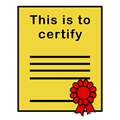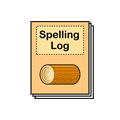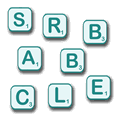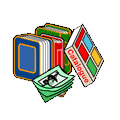| From... | to... |  |
English spelling may be a nightmare - but Spellzone shows you there are many things you can do to help yourself improve. This page gives you tips on the best approach to spelling problems:
1. First - don't despair! Some of the world's cleverest people have struggled with English spelling - you are not alone! Try out these ideas and you should soon see an improvement.
2. When you are practising spellings, use as many senses as you can:
 |
 |
In this way, you are using three senses to learn a word: sight, hearing and movement - the method most experts agree is best. The Spellzone course uses this approach:
 |
If you only use a keyboard, use that for your practice. You will be training your fingers to use the correct movements to spell that word or sound. However, despite the growing use of computers, most of us have to write by hand at some time - and this can be a very useful aid to learning in itself. Think about writing your name: |
 |
Your pen 'knows where to go' - it is automatic.
The same thing happens with some sounds:, when you hear the sound /ing/, your hand automatically writes the letters:
 |
When you write several words with the same letter pattern, you are training your hand to work automatically - soon you will not need to think about those words.
Never use capitals when writing to learn words - the word will have no shape, which will not help your visual memory. If possible use cursive script (joined writing) - the 'flow' of the writing helps the process become automatic.
Get as much practice as you can - the more you write, the better you
will get. Take a pride in your handwriting and work to improve it - if
your writing is clear, it will help you to remember how a word looks.
 |
3. We
are all different and we all make different spelling mistakes. To
make your learning personal to you, start
a 'Spelling Log' - your own personal dictionary.
Look carefully at the words you find hard and work out a way of remembering them (see the many tips on the next page). Write the words in your Spelling Log and keep the book with you at all times. Make use of odd moments to get learning - you don't even need a pencil - just looking at the words will help and you can also trace the letters with a finger on any surface - even your leg. |
| Get a friend to test you on your target words regularly - tick off a word each time you get it correct. Three ticks and you can be fairly sure that word is fixed in your head. |  |
No single spelling course can teach you every word you need to know.
We all have different needs, depending largely on our workplace or study
programme. If your work or study involves a particular set of words e.g.
technical terms, target those you are likely to need often. For example:
This course will teach you the common words beginning with pn (a
silent p):
| pneumatic | pneumonia |
| (the prefix pneu- is the Greek word for 'breathe') | |
 |
But, if you are studying medicine,
you will also need to know: pneumoconiosis (a lung disease) and pneumonectomy (removal of the lung) Your own Spelling Log should contain the words that YOU are most likely to need in your everyday life. |
| 4.
Dictionaries can be a help - sometimes - if you know how
to spell the start of a word! If you need a lot of help with spelling,
you might consider getting a specialist dictionary. Some examples: |
 |
Spelling dictionaries:
These list words only, with no meanings, which can make it easier
to find a word. They also give all the variations of a word, so that you
can see if adding a suffix means a spelling change. A typical entry from
a spelling dictionary:
|
taste tasteful tasteless tasty |
tasted tasteful taster
tasting tasty tastefully tastefulness tastlessly tastelessness tastier tastiest tastiness |
Phonetic dictionaries:
These list words by their sounds. For example, pneumonia will be found not only under 'p' but also under 'n'. Sometimes words are listed by their vowel sounds and how many syllables they have. This is part of a page in the 'ACE' dictionary (by Moseley & Nicol, published by LDA). Meanings are given only if they are homophones (words which sound the sound the same but have different spellings and different meanings):
F |
LONG VOWEL oe as in goat |
||
**fold (bend)folk fro froze phone |
**focusfolklore foretold frozen phobic phoneme photo |
***ferociousfocusing foliage folio phobia photograph |
****photocopyphotocopier photo-electric photo-finish photosynthesis |
'Normal' dictionaries often give a lot of information about word origins - and this word study can help to improve your spelling. This is an extract from Unit 35 - 'Why is English spelling so hard?' - a brief history of the English language. If you know where silent letters came from, you are more likely to remember them.
|
|
|||||||||||||||||||||
5. Playing word games with sympathetic friends will help your spelling. There are many games that involve making words from a random selection of letters, for example: Scrabble, Boggle, Word Spin.
 |
Keep your Spelling Log with you and jot down any new spellings you want to practice. |
| 6. Read a lot -
not just books but everything around you e.g. food packets, newspapers,
catalogues, billboards, road signs etc. This will fix the look of many common spelling patterns in your memory - which will help you to spot if one of your spellings doesn't 'look right'. |
 |
7. Tips for coping with everyday spelling:
|
 |
The Spellzone interactive course is intended to be used online and may not be printed.
"Spellzone really is an incredibly simple, engaging and cost effective resource - it makes a big difference to literacy levels."
Millthorpe School, York